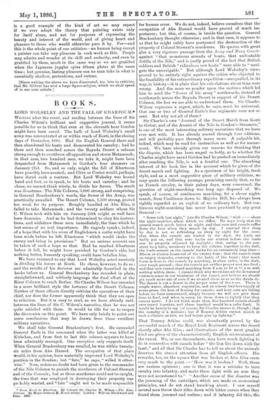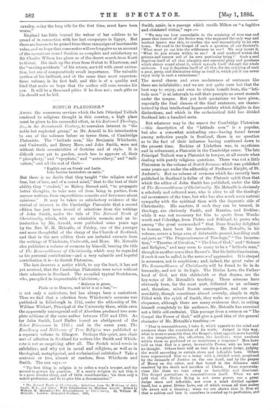BOOKS.
LORD WOLSELEY AND THE FALL OF KHARTOUM.* WRITING after the event, and reading between the lines of Sir Charles Wilson's brilliant and suggestive journal, it seems possible for us to think that even at the eleventh hour Gordon might have been saved. The bulk of Lord Wolseley's small army was concentrated at or within reach of Korti, in the closing days of December, 1884. Had the English General there and then abandoned his boats and dismounted his camelry ; had he there and then marched across the Baynda Desert a column strong enough to overthrow all opposition and storm Matammeh; in that case, two hundred men, we take it, might have been despatched from Matammeh in Gordon's four steamers on January 21st. So, and so only, might the fall of Khartoum have possibly been averted; and Clive or Cortez would, perhaps, have dared such a venture. But Lord Wolseley was bound hand and foot, so to speak, to his boats and camelry ; and he chose, we cannot think wisely, to divide his forces. The result was disastrous. The Nile Column, 3.000 strong, and comprising, in General Brackenbury's words, the flower of the Army, was practically annulled. The Desert Column, 1,500 strong, proved too weak for its purpose. Roughly handled at Abu Klea, it failed to take Matammeh ; and the twenty soldiers whom Sir C. Wilson took with him on January 24th might as well have been dummies. And as he had determined to obey his instruc- tions, and withdraw these men immediately, the time which he lost seems of no real importance. He vaguely speaks, indeed, of a hope that with his score of Englishmen a sortie might have been made before he left Khartoum " which would shake the enemy and bring in provisions." But no serious account can be taken of such a hope as that. Had he reached Khartoum before it fell, he might have perished by Gordon's side, but nothing better, humanly speaking, could have befallen him.
We have ventured to say that Lord Wolseley acted unwisely in dividing his forces at Korti. He chose, however, to do so ; and the results of his decision are admirably described in the books before us. General Brackenbury has recorded in plain, straightforward, and soldierly language the final effort of the River Column to reach Berber. Sir Charles Wilson has recorded in a more brilliant style the fortunes of the Desert Column. Neither of these officers directly criticise the operations of their chief, nor does the former apparently think that they are open to criticism. But it is easy to read, as we have already said, between the lines of Sir C. Wilson's narrative, that he was not quite satisfied with them. It would be idle for us to reopen the discussion on this point. We have only briefly to point out some conclusions that may be drawn from these excellent military narratives.
We shall take General Brackenbury's first. He succeeded General Earle in the command when the latter was killed at Kirbekan, and from first to last this column appears to have
been admirably managed. One exception only suggests itself. When General Brackenbury was recalled, he was within twenty-
six miles frotn Abu Hamed. The occupation of that place would, in his opinion, have materially improved Lord Wolseley's position in the Soudan; but. "fate," he says, " willed it other- wise." Now, orders no doubt had been given to the commander of the Nile Column to punish the murderers of Colonel Stewart and of the Consuls ; but as these murderers could not be caught, the time that was employed in destroying their property was probably wasted, and "fate" ought not to be made responsible
• From Korti to Khartum. By Colonel Sir Charles W. WS/ea.—The River Column. By Major•General H. Brackenlanry. London : William Blackwood and Eons. 1885.
for human error. We do not, indeed, believe ourselves that the- occupation of Abu Hamed would have proved of much im- portance; but this, of course, is beside the question. General Brackenbury thought otherwise ; and in that case, it appears to
us that he might safely have postponed the destruction of the property of Colonel Stewart's murderers. He quotes with great glee a very vigorous passage from the Army and Navy Gazette against " that monstrous armada of boats, that unfloatable flotilla of the Nile," and is justly proud of the fact that British.
soldiers and British "ridiculous row-boats" were able to " navi- gate the unnavigable." But although Lord Wolseley's views proved to be entirely right against the critics who objected to the feasibility of his extraordinary expedition—unequalled, in its way, in history—it is plain that his calculations about time were wrong. And the more we ponder upon the motives which led
him to send the "flower of his army" northwards, instead of southwards across the Bayuda Desert in support of his Desert Column, the less we are able to understand them. Sir Charles Wilson expresses a regret, which, he says, must be universal,
that one or two of General Earle's fine regiments were not so sent. But why not all of them ?
Sir Charles's own "Journal of the Desert March from Korti to Gubat, and of the Ascent of the Nile in Gordon's Steamers," is one of the most interesting•military narratives that we have ever met with. It has already passed through four editions, and will probably pass through many more. A palpable hit, indeed, which may be read for instruction as well as for amuse-
ment. We have already given our reasons for thinking that the dispute, which has been waged so hotly, as to whether Sir Charles might have saved Gordon had he pushed on immediately after reaching the Nile, is not a fruitful one. The absorbing interest of his book lies in the account which he gives of the desert march and fighting. As a specimen of his bright, fresh style, and as a most suggestive piece of military criticism, we may quote the following passage, premising merely that, so far as French cavalry, in their palmy days, were concerned, the question of night-marching was long ago disposed of. We speak, of course, of continuous marching, for a clever night- march, from Casilinum down to Majuba Hill, has always been rightly regarded as an exploit of no ordinary tact. But con-
tinuous night-marching has never been practised by any great General:- " Some talk last night," jots Sir Charles Wilson, " with — about the night-marches, about which we differ. He says truly that the camels march much better at night, and that men and camels suffer from the heat when they march by day. I contend that sleep by day is not so refreshing as sleep by night for the men ; that when the camels are loaded in the dark, the loads are badly put on, and that sore backs are started before the loads can be properly adjusted by daylight; that, owing to the con- stant long halts, necessary to keep the column together in the dark, the loads remain on the camels' backs for an excessively long time— fifteen or sixteen hours out of the twenty-four ; that the camels start on empty stomachs, contrary to the habit of the beast ; that much harm is done to the camels by marching, in close order, in the dark, over rough ground ; that the camels get neither proper rest nor food ; and that men cannot stand marching from 2 a.m. to 10 or 11 a.m. with nothing within them. I cannot think why we violate all the dictates of common-sense in our treatment of the camel, and believe we should get much more out of ours if we treated them more as the Arabs do. The desert is not a desert in the proper sense of the term. There is ample water, abundant vegetation, and an almost limitless supply of saves grass, the beat of feeding for camels; and here ours are falling before we have commenced, simply because we will not give them time to feed, and when in camp tie them down so tightly that they cannot move. I do not think more than five hundred camels should ever travel together, and three hundred would be a safer limit. It would be heresy to say [of course, Sir Charles means it, though] that the camelry is a mistake ; but if Tommy Atkins cannot march in such a climate as this, we had better give up fighting."
That Tommy Atkins could, was abundantly proved by the successful march of the Royal Irish Regiment across the desert shortly after Abu Klee ; and illustrations of the most graphic kind are given of the characteristically English mistreatment of the camel. We, or our descendants, may have much fighting to do in connection with camels before " the lion lies down with the lamb," and all that Sir Charles has to tell us about the animals deserves the utmost attention from all English officers. His remarks, too, on the square that was broken at Abu Klea seen very much to the point :— How was it broken ? Well, there are various opinions ; one is that it was a mistake to turn cavalry into infantry, and make them fight with an arm they were not accustomed to." "Another cause of the disaster was the jamming of the cartridges, which are made on economical principles, and do not stand knocking about. I saw myself several men throw their rifles down with bitter curses when they found them jammed and useless ; and if infantry did this, the cavalry, using the long rifle for the first time, must have been worse."
England has little beyond the valour of her soldiers to be proud of in connection with her last campaigns in Egypt. But there are lessons to be gained from these campaigns of inestimable value, and we hope that some writer will ere long give us an account of the operations round Suakim as complete and satisfactory as Sir Charles Wilson has given us of the desert march from Korti to Gubat. His dash up the river from Gubat to Khartoum, and the "moving accidents of his return, are told with great anima- tion, but aro of comparatively small importance. The valuable portion of his brilliant, and at the same time most unpreten- tious volume, is its first half, and this is of a quality and kind that make us hope that the author will soon resume his pen. It will be a thousand pities if he does not ; such gifts as his should not be hid.





































 Previous page
Previous page